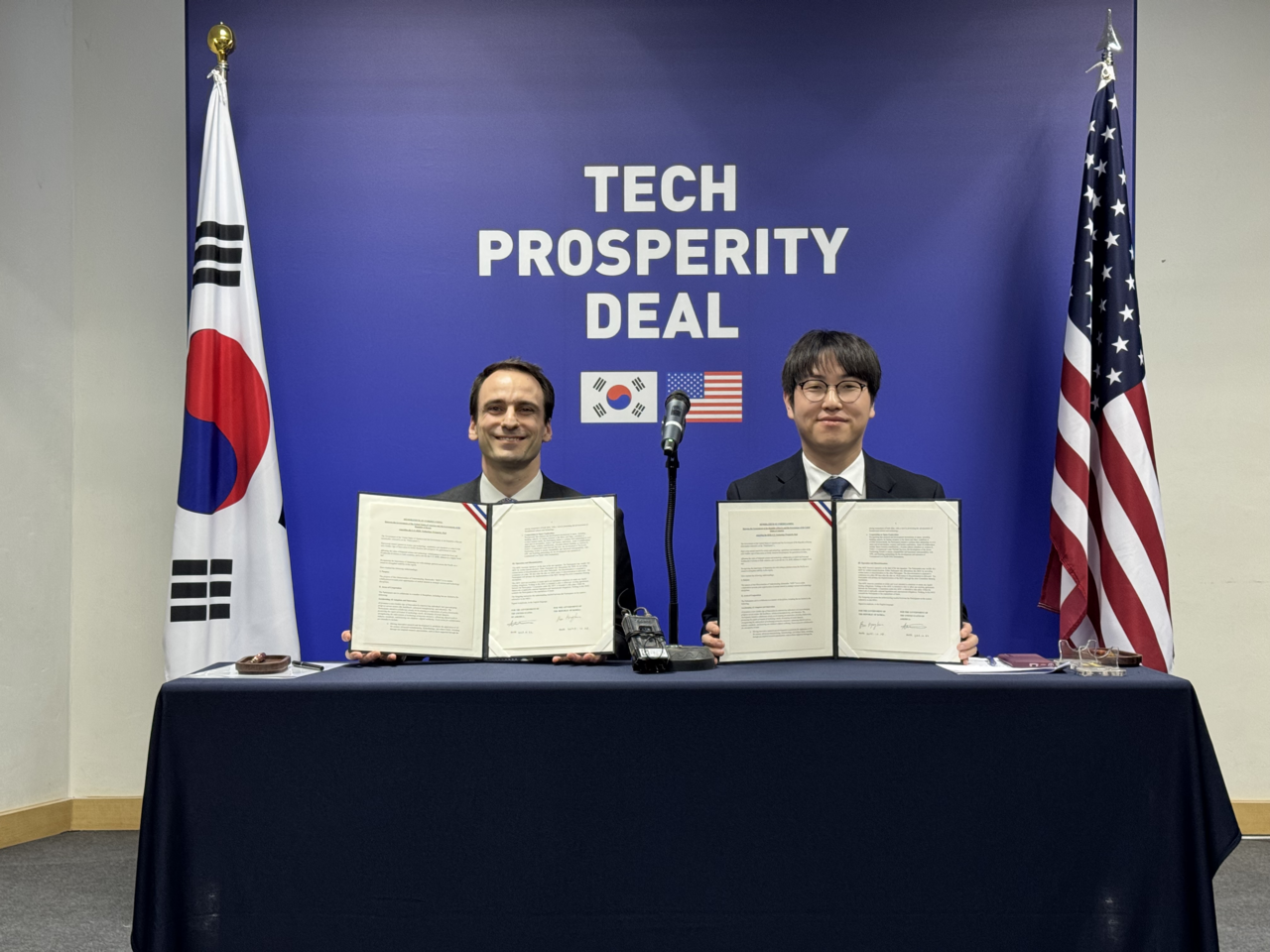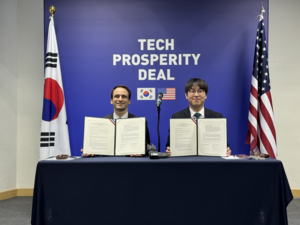 Ha Jung-woo (right), South Korea’s senior presidential secretary for AI and future planning, and Michael Kratsios, director of the US’ White House Office of Science and Technology Policy, pose for a photo during the signing ceremony of a technology pact in Gyeongju, North Gyeongsang Province, Wednesday. (Ministry of Science and ICT)
Ha Jung-woo (right), South Korea’s senior presidential secretary for AI and future planning, and Michael Kratsios, director of the US’ White House Office of Science and Technology Policy, pose for a photo during the signing ceremony of a technology pact in Gyeongju, North Gyeongsang Province, Wednesday. (Ministry of Science and ICT) GYEONGJU, North Gyeongsang Province — South Korea and the United States signed a technology cooperation pact Wednesday, pledging to boost collaboration in artificial intelligence, quantum computing and other emerging technologies.
The agreement, dubbed the “Technology Prosperity Deal,” was signed by Ha Jung-woo, Seoul’s senior secretary to the president for AI and future planning, and Michael Kratsios, director of the US’ White House Office of Science and Technology Policy, on the sidelines of the Korea-US summit during APEC meetings in Gyeongju, North Gyeongsang Province.
“The agreement we are signing today will be built on a strong foundation expanding our cooperation to key areas including AI, biotech, 6G, quantum and space exploration,” Ha said during the signing ceremony. “I’m confident that this will be an important milestone to our shared prosperity.”
Under the pact, the two countries will collaborate in key two areas — accelerating AI application and innovation and advancing trusted technology leadership. The deal aims to strengthen technology sovereignty and ensure secure, transparent development of next-generation technologies, the ministry said.
Noting that the signals the US’ “deep respect” for Korea as a trusted technology partner, Kratsios said the bilateral efforts of the two countries will promote “full-stack” AI export deals around the world that incorporate technologies of both countries.
“The US-Korea Technology Prosperity deal will advance our interests by coordinating US and Korean AI exports, strengthening both countries’ export controls and enforcement and refocusing the partnership between the US center for AI standards innovation and its Korean counterpart towards AI metrology and standards progress,” Kratsios said.
Under the new deal, Seoul and Washington will develop a joint AI policy framework, cooperate on full-stack AI technology exports and promote a shared AI ecosystem in Asia and beyond. They also agreed to work together on developing trustworthy AI systems, shared datasets and safety standards for AI use.
Their agreement also covers next-generation communications, biotechnology supply chains, quantum research and space exploration. Both governments said they will strengthen research security and expand basic science cooperation and talent exchanges.
Following the signing ceremony, Kratsios and Ha also held closed-door talks to discuss the next steps to develop their pact. According to Seoul’s Science Ministry, the Korea-US Joint Committee on Science and Technology will oversee implementation, with the next meeting to be held in Washington in 2026.
The Technology Prosperity Deal expands the two countries’ long-standing science and technology partnership that began with a 1992 bilateral accord and later extended to nuclear energy and space exploration. It follows similar agreements on tech cooperation that the US signed with Japan on Tuesday and last month with the UK.
“This agreement marks the first step in our shared efforts to actively shape the future together through innovation rather than passively waiting for it to unfold,” Ha said.
“Building on this MOU (memorandum of understanding) the Korean government will continue to support technological cooperation and innovation between our two countries and actively engage the private sector to achieve meaningful tangible results.”
The administration of US President Donald Trump has made AI and quantum computing key pillars of its technology policy, seeking to counter China’s state-backed investments in those fields. Washington announced its AI action plan in July and has since accelerated development of AI infrastructure.
Seoul is also preparing its own AI action plan, expected in November, aimed at fostering a public-private AI innovation ecosystem and driving nationwide AI transformation.
herim@heraldcorp.com
